Caliphate over Africa: The Islamic State’s Boko Haram Franchise
Boko Haram’s “threshold for horror” continually rises
By Andrew Harrod, PhD. Exclusive to the Religious Freedom Coalition
Nigerian human rights lawyer Emmanuel Ogebe discussed with Powerpoint a “New Arc of Evil: The Boko Haram/ISIS Merger” during the Hudson Institute’s March 23 panel “Boko Haram, the Islamic State’s West African Franchise.” Ogebe and his fellow panelists examined before an audience of about 50 the dangerous, bloody ramifications of unity between Nigeria’s Boko Haram jihadists and their similarly brutal allies in the Islamic State of Iraq and Syria.
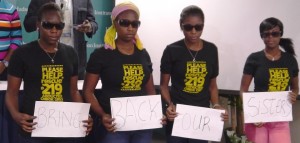
Young Christian women display signs asking for the return of their sisters kidnapped by the Boko Haram
Ogebe noted a recent “wedding announcement in the Washington Post” in which Boko Haram proposed and ISIS accepted an allegiance to the latter’s self-declared caliphate, a move that reflected the two groups’ “grudging admiration and rivalry.” While Hudson religious freedom scholar Nina Shea saw in Nigeria under the ravages of the “ultra-violent” Boko Haram “human rights suffering…of epic proportions,” a Boko Haram -ISIS alliance will only worsen matters. Boko Haram jihadists “already have an international operation going” that has killed nationals from 15 states, stated Ogebe. Boko Haram’s “large operational theater” encompasses not just Nigeria but its neighbors of Niger, Mali, and Cameroun, an area more extensive than ISIS’ considerable holdings. ISIS has called for “Muslim brothers” who cannot reach it to join Boko Haram, creating thereby a “whole new frontier of terror” and “new flank” in Boko Haram, as demonstrated by Frenchmen caught fighting for Boko Haram in Cameroun.
Ogebe’s slides noted that Boko Haram was the world’s third deadliest terrorist organization after Taliban groups in Afghanistan and Pakistan during the years 2009-2013 while ISIS was only in fourth place. News reports and ISIS’s “more tech savvy” media edge over Boko Haram despite its recent advances obscured that Boko Haram was the deadlier of the two groups, killing more people last January than ISIS killed in six months last year. While ISIS beheading of 21 Egyptian Copts in Libya garnered a shocked world’s attention, Boko Haram killed over 150 in September 2013 with chainsaws used to behead quickly Christians caught in a staged army checkpoint.
Ogebe observed that Boko Haram’s “threshold for horror” continually rises and amazes him with ever greater heights of brutality. Boko Haram’s slaughter of 59 boys at a boarding school and kidnapping of 276 schoolgirls in the village of Chibok followed in 2014 the “chainsaw massacre.” Al Qaeda (AQ) actually condemned the “mind-numbing” Chibok kidnappings, Ogebe recalled; “that’s when you know that you are in a really bad place.” Recently retreating Boko Haram fighters had killed their wives so that they would not remarry and supposedly be available in heaven. The Nigerian Bukky Shonibare from the Bring Back Our Girls aid campaign for the Chibok girls suggested that Boko Haram killed these wives, who in many cases are just adolescents forced into marriage, in order to prevent their revealing information. Ogebe noted that Boko Haram took 13 years before its annual killing rate last year equaled the Taliban; “given a little time, they can do great damage” in a “piecemeal Third World War” first suggested by Pope Francis.
At times on the verge of tears, Shonibare brought Boko Haram horrors in her Nigerian home to life. She discussed how 57 of the Chibok girls had left Boko Haram captivity in various ways, sometimes returning home pregnant or infected with HIV/AIDS. Some of the girls had developed an allegiance to their captors under a Stockholm syndrome, such as one girl released by Boko Haram who actually killed her own mother. Boko Haram has also duped “innocent, naïve girls” into suicide bombing operations, forcing mothers of the Chibok captives to worry about losing their daughters whenever there is a suicide bombing report. Referencing the four Nigerian schoolgirls sitting in the front row at Hudson, escapees from Boko Haram within the first two days of the Chibok kidnapping, Ogebe noted that three of them had lost family members to Boko Haram violence in the last month, a terrible statistic.
[su_button url=”http://www.Christmas4Refugees.org”]A Christmas meal for a Christian refugee child – Make it happen[/su_button]
In the face of such a grave struggle, Ogebe criticized deficient foreign aid for Nigeria. He had a “rude awakening” following the Bring Back Our Girls Twitter campaign when only private, but no public, resources became available to bring Boko Haram escapees to the United States for assistance. The American government even denied one girl a visa.
The Nigerian government also requested military training from the United States, but met with American objections that Nigerian forces did not possess proper equipment, Ogebe said. Yet American officials rebuffed Nigerian military equipment cash purchases even as an Iraq fighting ISIS and suffering from depressed oil prices received American military aid credits. Nigeria, meanwhile, had hired South African and Russian mercenaries to fight Boko Haram, showing how “in Nigeria you have to outsource a lot of stuff,” he said. Along with Boko Haram foreign fighters, “two can play at this game,” but he worried about the mercenaries’ capabilities in light of a South African’s recent friendly fire death.
Shea critiqued American policymaker unwillingness to recognize Boko Haram’s jihadist ideology. As on previous occasions, she cited Assistant Secretary of State for African Affairs Johnnie Carson’s ludicrous 2012 statement that Boko Haram violence resulted from socioeconomic grievances like “poor government service delivery.” By contrast, Ogebe recalled Boko Haram’s original name of the “Nigerian Taliban” and how coalition forces overthrowing the Taliban after AQ’s September 11, 2001, attacks discovered Nigerian Muslims in Afghanistan. “Maybe this merger will now get their attention,” Shea stated.
Shea’s comments are noteworthy, for as Boko Haram and ISIS show, neglect and ignorance merely allow jihadist threats to metastasize over time. Boko Haram and ISIS present growing dangers in their own right to their respective regions and the wider world. Cooperation between the two and other jihadist groups will only multiply the threats. Freedom’s defenders have no time for idleness before such gathering storms. NOTE: VIDEO OF PANEL BELOW!
<iframe width=”560″ height=”315″ src=”https://www.youtube.com/embed/lMSe4gkvLhg” frameborder=”0″ allowfullscreen></iframe>

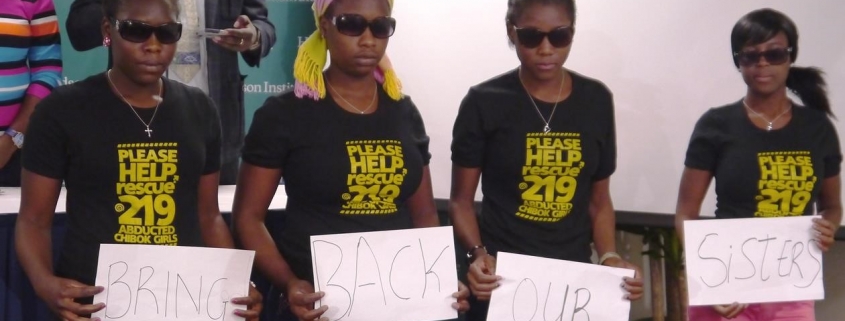
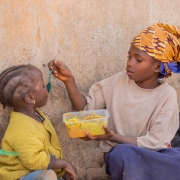


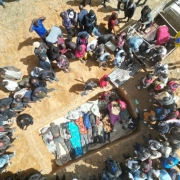
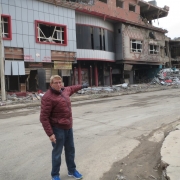
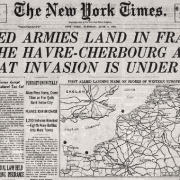




Leave a Reply
Want to join the discussion?Feel free to contribute!